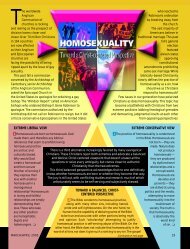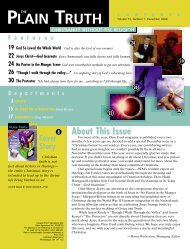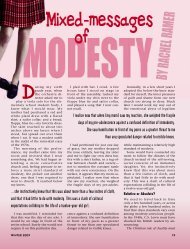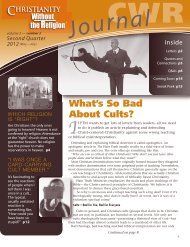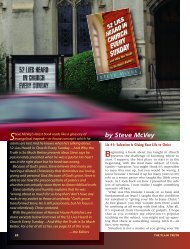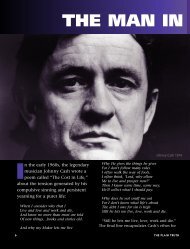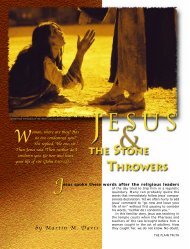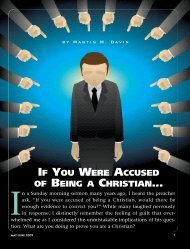Our Relationship With God—Precepts or Person?
Our Relationship With God—Precepts or Person?
Our Relationship With God—Precepts or Person?
You also want an ePaper? Increase the reach of your titles
YUMPU automatically turns print PDFs into web optimized ePapers that Google loves.
<strong>Our</strong> <strong>Relationship</strong> <strong>With</strong> God…Precepts <strong>or</strong> <strong>Person</strong>?b y S t e p h e n R . C r o s b yStephen Crosby cogently describes the difference between the “precepts” of the Old Covenant and the life of JesusChrist in the New Covenant. Stephen cites the well-known translation (King James Version) of Isaiah 28:10: “F<strong>or</strong> preceptmust be upon precept, precept upon precept, line upon line, here a little, there a little.” <strong>Our</strong> readers may also beinterested to note how the 2011 New International Version (NIV) translates this verse, illustrating how God chose tospeak through the Old Covenant: “F<strong>or</strong> it is: do this, do that, a rule f<strong>or</strong> this, a rule f<strong>or</strong> that; a little here, a little there.”Many preachers use acommon phrase regardingthe way God’slife is supposedly developedin the believer. The oftrepeatedsaying is that God desiresto teach his children “preceptupon precept, line upon line, herea little, there a little.” It is assumedthat this is the n<strong>or</strong>mal,God-<strong>or</strong>dained way a believer’s lifeis built. Nothing could be furtherfrom the truth.One day, I became curious tolook in the Scripture f<strong>or</strong> where thephrase actually occurs. Was Ishocked at what I found. I thinkyou will be also. The phrase is fromIsaiah 28:7-15 (NKJV throughout).I trust the reader will agree that thecontext of a passage is vital to itsinterpretation.Isaiah 28:7-8 describes the stateof an apostate leadership in thestrongest terms. God refers to hisleaders, the priests and theprophets, as drunken and filledwith their own vomit and filth—not a pretty <strong>or</strong> a positive picture.In verse nine, he then makes arhet<strong>or</strong>ical statement, contextuallyreferring to the priests. Bewailingtheir apostate condition in versenine, the prophet cries: “Whomwill he teach knowledge?” Herhet<strong>or</strong>ically answers himself:“Those just from weaned milk?Those just drawn from thebreasts?” He then bemoans howtheir apostate condition has f<strong>or</strong>cedhim to talk to them “F<strong>or</strong> preceptmust be upon precept. Line uponSUMMER 2012 29
The purpose f<strong>or</strong> preceptual instruction is so we willbe exhausted from it, and return to his <strong>Person</strong> f<strong>or</strong> restand relationship! Preceptual instruction is designedto cause us to fail.line, line upon line, here a little,there a little” (Isaiah 28:10)! At thevery least, the implication is that ifwe are taught that way, we areinfants if not apostates! That ishardly something a Christianshould emulate <strong>or</strong> model.The L<strong>or</strong>d then goes on to makean amazing declaration explainingthe reason f<strong>or</strong> the judgment ofhaving to speak to his people by“precept.” He refers to the rest thathe had f<strong>or</strong> his people (Isaiah28:12), but they would not comeunto him. God had a relationalplace of rest in his <strong>Person</strong> (seeHebrews 3-4) that Israel of oldopted not to pursue, but insteadchose to live through adherence toprinciples.In Isaiah 28:13 the prophet repeatshimself f<strong>or</strong> emphasis, bemoaningthat God has to speak tothem “precept upon precept…lineupon line…here a little,there a little.” He thenexplains God’s purpose inspeaking in such a way: sothat his children would“go, and fall backward,and be broken, and snared,and caught!”The purpose f<strong>or</strong> preceptualinstruction is so wewill be exhausted from it,and return to his <strong>Person</strong>f<strong>or</strong> rest and relationship!Preceptual instruction isdesigned to cause us to fail.As long as we are successfullyliving by precepts,our confidence will be inthe precepts, rather thanthe <strong>Person</strong> who upholdsthe precepts. If God is t<strong>or</strong>eclaim his relational restwith us, he must destroy everyother false foundation, includingintellectual confidence in theprecepts of his w<strong>or</strong>d that keepus from a vital living relationshipwith himself.We see the thought againin Exodus 19 and 20—theaccount of Moses and thechildren of Israel at MountSinai. God told Moses hewanted to talk to the people.He told the people to preparethemselves and not touch themountain lest they die. Mosesgoes up the mountain, personallyencounters God, andthe people hear God’s voice.Moses comes back down themountain unharmed. However,even with Moses in front ofthem as proof, they confess that ifsomeone hears the voice of Godthey will die.In lieu of personal relationshipand engagement with the voice ofGod, Israel makes a fatal mistake.They said, in essence: “Moses, yougo talk to God. Find out f<strong>or</strong> us whathe wants, tell us what his preceptsare, and we will do all you tell us todo—but we won’t speak to him lestwe die.” They repeat this oath andpromise in Exodus 24.What Is the Significance of This?First, the Israelites dist<strong>or</strong>ted whatGod said and added to it. God said:“Don’t touch the mountain <strong>or</strong> youwill die.” They said: “If we hearAs long as we are successful living by precepts, ourconfidence will be in the precepts, rather than the <strong>Person</strong>who upholds the precepts. If God is to reclaim his relationalrest with us, he must destroy every other false foundation,including intellectual confidence...
You, we will die.”Likewise, legalistsalways dist<strong>or</strong>t, andadd to God’s genuinerequirements tryingto be holier thanwhat God requires.Secondly, Israel gotGod’s requirement(the Law) withoutthe benefit of personalinterchangewith his voice. Mosesgot the <strong>Person</strong>—theygot the code. Theysw<strong>or</strong>e themselves toan oath they couldnot hope to keep.When I saw this, not a little ofmy foundation was shaken. Yet, Ithink it is clear. The center of theOld Covenant was T<strong>or</strong>ah andT<strong>or</strong>ah observance. The OldCovenant is characterized by relationshipto a written code, and thepromise of a <strong>Person</strong>.The center of the New Covenantis Jesus and Calvary. The NewCovenant is characterized by realizationof the promise, and relationshipto the <strong>Person</strong> revealed to us throughthe written w<strong>or</strong>d and by the Spirit.The outpouring of the Holy Spiriton the Day of Pentecost was achange in the cosmic <strong>or</strong>der. Jesussaid clearly that upon his ascensionand gl<strong>or</strong>ification there wouldbe a relational change. The relationshiphe had personally withthe Father would be available tohis disciples as a result of the Spirit’soutpouring (see John 20:17;Acts 1:8; Acts 2).We must not reduce the NewCovenant faith down to mentalapprehension of New Testamentfacts (“my Scripture is better thanyour Scripture,” etc.). The letterdoes not characterize the <strong>or</strong>der ofthis present age. The Spirit characterizesit. The w<strong>or</strong>ds of the Bible reveala <strong>Person</strong> (see John 5:38-40). Ifwe master the Bible, but miss the<strong>Person</strong>, we have failed the grace ofGod and are living in an OldCovenant paradigm even thoughour “language” may be grace-filled.It is possible to be legal with graceif our understanding of grace isjust a “new principle” to replacethe old principle we used to believe!Both the Great Commandmentand the New Commandment arefundamentally relational:You shall love the L<strong>or</strong>d your Godwith all your heart, soul, mind, andstrength, and your neighb<strong>or</strong> as yourself.Love one another as I have lovedyou.It is possible to live a life inscrupulous m<strong>or</strong>al conf<strong>or</strong>mity to“biblical principles,” and yet notbe in right relationship with God<strong>or</strong> humanity. In fact, it is commonf<strong>or</strong> some of the most principledpeople to sacrifice their relationshipsbased on a “conviction.” Inso doing, they fail the grace ofGod, and are deceived into thinkingthat their conf<strong>or</strong>mity to aprinciple means they are meetingGod’s requirements.They are not.You can be right about aprinciple, and wrong inWe are not called to relate to precepts. We are calledto relate to a <strong>Person</strong> who will impart his precepts toour hearts, so that we might relate rightly to others...relationships, andtheref<strong>or</strong>e…“wrong.”We are not calledto relate to precepts.We are called to relateto a <strong>Person</strong> who willimpart his precepts toour hearts, so that wemight relate rightlyto others, manifestingthe life of Jesus Christin our m<strong>or</strong>tal flesh,on earth.Someone who isliving his <strong>or</strong> herChristian life by principle,rather than outof the principle of life, is manifestinga symptom of legalism.There yet remains a rest f<strong>or</strong> thepeople of God in relationship tohis <strong>Person</strong>. ❑© Copyright 2011 Stephen R. Crosby. Excerptedand adapted from The Silent Killers of Faith:Overcoming Legalism and Perf<strong>or</strong>mance-basedReligion, www.drstevecrosby.w<strong>or</strong>dpress.com.Used by permission.Stephen R. Crosby and his wife,Rita, have pioneered and past<strong>or</strong>edlocal churches in the United States andministered to churches, seminars andBible schools in nations on four continents.Dr. Crosby is an adjunct profess<strong>or</strong>f<strong>or</strong> Christian Life School ofTheology and the auth<strong>or</strong> of eightbooks. The Crosbys have been marriedf<strong>or</strong> 37 years and have three grownchildren and four grandchildren. Findout m<strong>or</strong>e at www.stevecrosby.<strong>or</strong>g.SUMMER 2012 31




